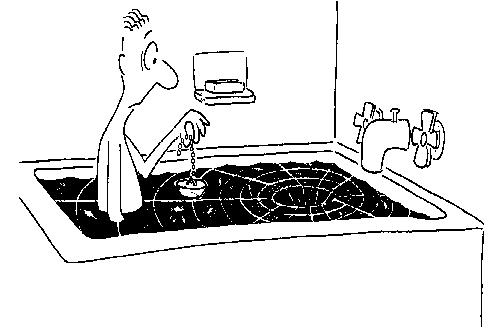
Posted on 04/05/2005 10:43:19 AM PDT by ShadowAce
Black holes are staples of science fiction and many think astronomers have observed them indirectly. But according to a physicist at the Lawrence Livermore National Laboratory in California, these awesome breaches in space-time do not and indeed cannot exist.
Over the past few years, observations of the motions of galaxies have shown that some 70% the Universe seems to be composed of a strange 'dark energy' that is driving the Universe's accelerating expansion.
George Chapline thinks that the collapse of the massive stars, which was long believed to generate black holes, actually leads to the formation of stars that contain dark energy. "It's a near certainty that black holes don't exist," he claims.
Black holes are one of the most celebrated predictions of Einstein's general theory of relativity, which explains gravity as the warping of space-time caused by massive objects. The theory suggests that a sufficiently massive star, when it dies, will collapse under its own gravity to a single point.
But Einstein didn't believe in black holes, Chapline argues. "Unfortunately", he adds, "he couldn't articulate why." At the root of the problem is the other revolutionary theory of twentieth-century physics, which Einstein also helped to formulate: quantum mechanics.
In general relativity, there is no such thing as a 'universal time' that makes clocks tick at the same rate everywhere. Instead, gravity makes clocks run at different rates in different places. But quantum mechanics, which describes physical phenomena at infinitesimally small scales, is meaningful only if time is universal; if not, its equations make no sense.
This problem is particularly pressing at the boundary, or event horizon, of a black hole. To a far-off observer, time seems to stand still here. A spacecraft falling into a black hole would seem, to someone watching it from afar, to be stuck forever at the event horizon, although the astronauts in the spacecraft would feel as if they were continuing to fall. "General relativity predicts that nothing happens at the event horizon," says Chapline.
Quantum transitions
However, as long ago as 1975 quantum physicists argued that strange things do happen at an event horizon: matter governed by quantum laws becomes hypersensitive to slight disturbances. "The result was quickly forgotten," says Chapline, "because it didn't agree with the prediction of general relativity. But actually, it was absolutely correct."
This strange behaviour, he says, is the signature of a 'quantum phase transition' of space-time. Chapline argues that a star doesn't simply collapse to form a black hole; instead, the space-time inside it becomes filled with dark energy and this has some intriguing gravitational effects.
Outside the 'surface' of a dark-energy star, it behaves much like a black hole, producing a strong gravitational tug. But inside, the 'negative' gravity of dark energy may cause matter to bounce back out again.
If the dark-energy star is big enough, Chapline predicts, any electrons bounced out will have been converted to positrons, which then annihilate other electrons in a burst of high-energy radiation. Chapline says that this could explain the radiation observed from the centre of our galaxy, previously interpreted as the signature of a huge black hole.
He also thinks that the Universe could be filled with 'primordial' dark-energy stars. These are formed not by stellar collapse but by fluctuations of space-time itself, like blobs of liquid condensing spontaneously out of a cooling gas. These, he suggests, could be stuff that has the same gravitational effect as normal matter, but cannot be seen: the elusive substance known as dark matter.
Science ping
Ping
I disagree. Black holes do exist. Just look in Michael Schiavo's eyes.
Sounds like someone is picking a fight with the guy in a wheelchair...only in this case, the guy is Stephen Hawking. When in doubt, bet on Hawking.

It has always seemed to me that humans (being a part of the universe) cannot understand the whole. It's like try to catch a shadow.
This is wrong.
Dark energy is an expansive, repulsory effect. This would negate the effects of a collapsing star if there was some sort of "transition"
What if Einstein had math anxiety? Would black holes be discovered earlier?

It's black and it looks like a hole. I guess it's a black hole.
I am so glad to hear this because I have been VERY worried. <;9//>
"When in doubt, bet on Hawking."
Except that Hawking lost his last bet (3rd paragraph of linked article below):
http://www.nature.com/news/2004/040712/full/040712-12.html
Oops. Sorry. The title search function seems to be a little, uh, unreliable.
"My head hurts" ping.
...Poppycock! I saw one run for the presidency not a year ago, and his name was Rev. Al Sharpton.
there is a bad sex joke in here somewhere.........ahhh never mind
Next thing you know they'll be telling us that manmade global warming doesn't exist (sarcasm ended).
Disclaimer: Opinions posted on Free Republic are those of the individual posters and do not necessarily represent the opinion of Free Republic or its management. All materials posted herein are protected by copyright law and the exemption for fair use of copyrighted works.